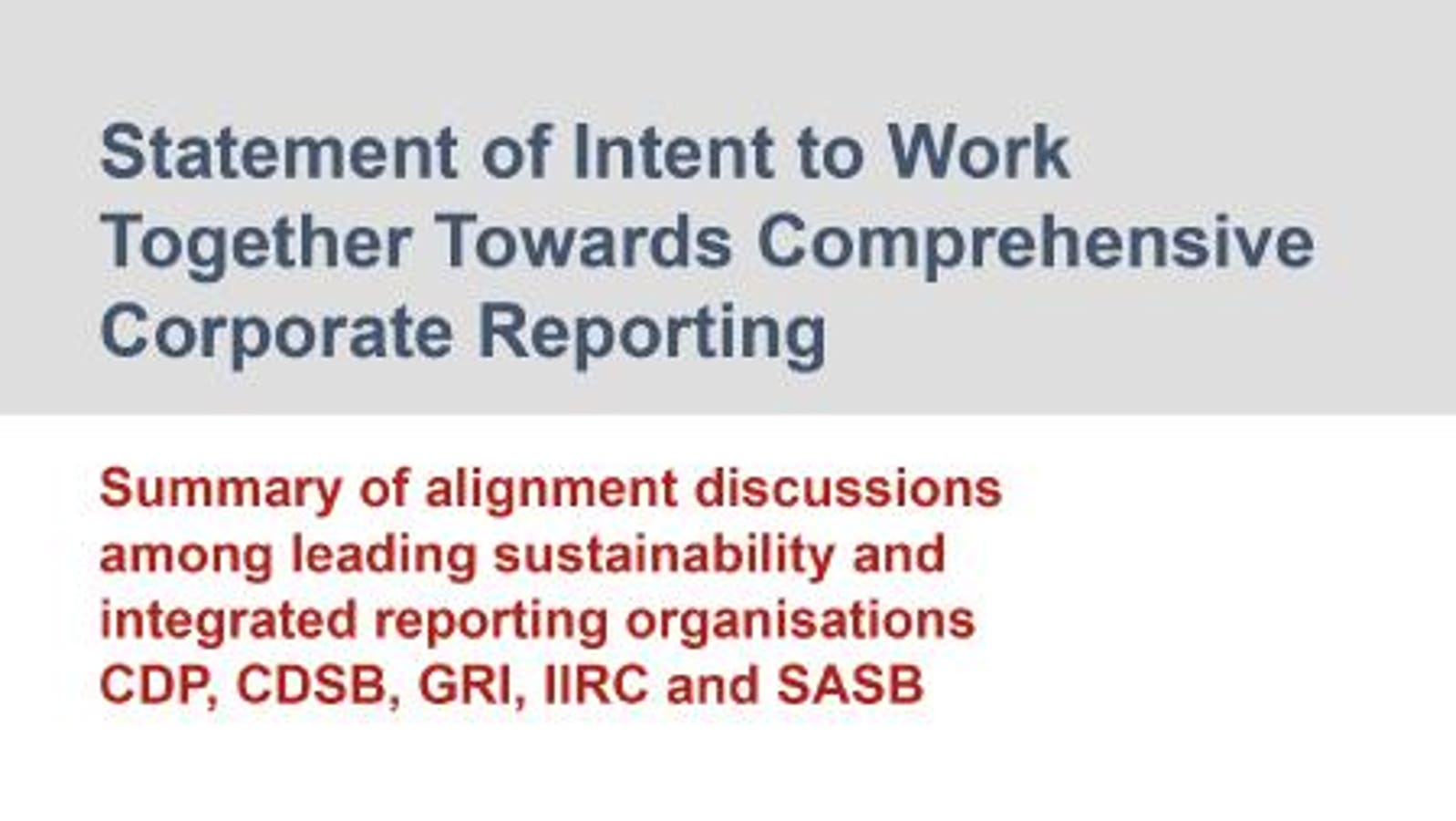In March of this year I wrote about how to establish a global set of standards for companies to report on their environmental, social, and governance (ESG) performance—or so-called “nonfinancial information.”
I’m pleased to report that significant progress has been made in the past five months.
Key to this achievement is the foundational work of five NGOs (The Five) whose missions are aligned with this goal: CDP, the Climate Disclosure Standards Board (CDSB), the Global Reporting Initiative (GRI), and the Sustainability Accounting Standards Board (SASB), guide the overwhelming majority of ESG disclosure and the International integrated Reporting Council (IIRC) provides the framework for how to connect ESG disclosure to reporting on financial and other capitals.
Their work is particularly critical now, as governments and major accounting bodies are acting on standards. The IFRS and IFAC have recognized the need for mandated standards for nonfinancial information. The EU, in reviewing its Non-financial Reporting Directive (NFRD), has instructed EFRAG to establish a European Lab Project Task Force to make recommendations on standards for nonfinancial information, as a prelude to their stated intention to regulate. And a variety of business groups, including the IBC/WEF and the Big Four have voiced the need for global ESG reporting standards for companies and markets.
All of these groups should build on the work of “The Five.”
Not only are they field leaders, they also recognize that they are stronger as a group than individually. And while each of “The Five” has its own particular approach to ESG standards and reporting, much of their technical content is complementary rather than overlapping. This is clear in their recent “Statement of Intent to Work Together Towards Comprehensive Corporate Reporting (The Statement)” authored by The Five and facilitated by the Impact Management Project, the World Economic Forum, and Deloitte. I think this is the most significant step in setting global ESG reporting standards taken to date.
In order to better understand the motivation behind this report and what these organizations hope will come out of it, I spoke with Janine Guillot (CEO of SASB), Eric Hespenheide (Chairman of GRI), Mardi McBrien (Managing Director of CDSB), Paul Simpson (CEO of CDP), and Charles Tilley (CEO of the IIRC).
All five cited a shared sense of urgency as a motivating factor. “The time has come,” McBrien said, for “getting decision-ready ESG information to the capital markets.” Companies and investors have been clamoring for this, expressing confusion about the number of different frameworks and standards. Pressure has grown dramatically as sustainability has become mainstream. As Tilley put it, “This is a fantastic time to be able to take all of these initiatives together and to drive change.” McBrien and Simpson noted that the organizations had worked together bilaterally in various ways in the past, but Simpson acknowledged that “We’ve all felt the pressure for greater coherence and to show how we are complementary.”
In “The Statement” they were able to do so. Guillot observed, “I’m particularly proud that we were able to lay out a common language for the field and articulate how the actors fit together within that.” Hespenheide pointed out a deeper benefit to their work by noting that “This is an opportunity to define, as a group but [also] individually, what is meant by the terms ‘collaboration, rationalization, and harmonization.’”
Getting five people from different organizations to agree on the content of a report can be challenging. McBrien noted that the group “drew on what was already in the market and filled in the gaps behind that,” observing that, “This is the first time that five of us have sat around a table and have had a good conversation about how to work through the trickier parts.”
One of the trickiest parts is the definition of materiality. Guillot framed it this way: “Can you delineate views on materiality, or are they really one?”
The simplest framing of this question is whether what defines a material issue from a reporting point of view is something that matters to investors or something that matters to society. The former is about long-term enterprise value creation. The latter is about the positive and negative externalities in the world being created by a company’s operations, products, and services. Simpson noted that “how to delineate what is material for enterprise value creation, and for wider impact on people and planet was the biggest dialogue and debate that we had. What is material to some and not to others, and over what time frame. The EU’s notion of “double materiality” recognizes the importance of both perspectives.”
The Five took a big step forward in the practical resolution of this question by explaining materiality as a nested concept. As shown below, Figure 2 from “The Statement” depicts materiality as emanating outward from a core of information reflected in the financial accounts, which is handled by FASB and the IASB; then to a complement of ESG information that is material for enterprise value creation, which is the focus of SASB (relevant industry-specific information) and CDSB (a complementary slice of industry-agnostic disclosure on climate and other environmental matters). This information, in turn, is a subset of the full range of relevant ESG information that GRI addresses for reporting to a broad range of users, of which CDP’s market-led disclosure platform covers climate, water, and forestry in greater depth. The IIRC’s “International <IR> Framework,” which is focused on value creation over the long-term, connects reporting of ESG information to reporting on financial and other capitals.
SUBSCRIBE TO OUR NEWSLETTER
Subscribe our newsletter to receive the latest news, articles and exclusive podcasts every week


